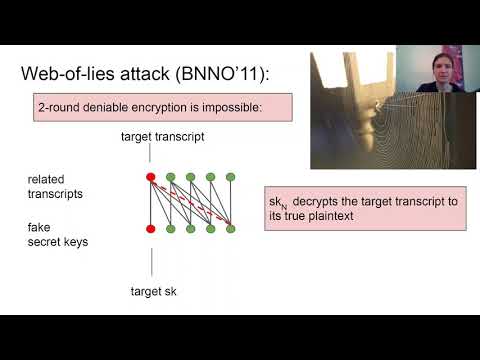CryptoDB
Fully Deniable Interactive Encryption
| Authors: |
|
|---|---|
| Download: |
|
| Conference: | CRYPTO 2020 |
| Abstract: | Deniable encryption (Canetti \emph{et al.}, Crypto 1996) enhances secret communication over public channels, providing the additional guarantee that the secrecy of communication is protected even if the parties are later coerced (or willingly bribed) to expose their entire internal states: plaintexts, keys and randomness. To date, constructions of deniable encryption --- and more generally, interactive deniable communication --- only address restricted cases where only {\em one} party is compromised (Sahai and Waters, STOC 2014). The main question --- whether deniable communication is at all possible if {\em both} parties are coerced at once --- has remained open. We resolve this question in the affirmative, presenting a communication protocol that is {\em fully deniable} under coercion of both parties. Our scheme has three rounds, assumes subexponentially secure indistinguishability obfuscation and one-way functions, and uses a short global reference string that is generated once at system set-up and suffices for an unbounded number of encryptions and decryptions. Of independent interest, we introduce a new notion called \emph{off-the-record deniability}, which protects parties even when their claimed internal states are inconsistent (a case not covered by prior definitions). Our scheme satisfies both standard deniability and off-the-record deniability. |
Video from CRYPTO 2020
BibTeX
@inproceedings{crypto-2020-30523,
title={Fully Deniable Interactive Encryption},
publisher={Springer-Verlag},
doi={10.1007/978-3-030-56784-2_27},
author={Ran Canetti and Sunoo Park and Oxana Poburinnaya},
year=2020
}

